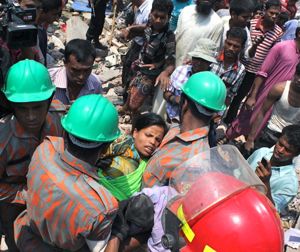A Labourstart Campaign

Hundreds of garment workers were killed and injured when an 8 story building housing five textile factories collapsed on 24 April.
Large structural cracks appeared in the Rana Plaza the day before and an evacuation order was given. The building and factory owners ignored the warning and insisted work continue hours before the building collapsed.
This, the worst ever, industrial accident in Bangladesh comes only months after more than one hundred garment workers died in two factory fires.
Working for a minimum wage of US$38 per month, less than one percent of garment workers in Bangladesh are represented by a union.
The Labour Law leaves workers unable to join a union and fight for safe workplaces, improved working conditions and better wages.
IndustriALL Global Union and IndustriALL Bangladesh Council is calling on the government to take urgent action to guarantee freedom of association and improve building and fire safety and the minimum wage for the more than 3 million garment workers in Bangladesh.
Send your message supporting these demands to the Bangladesh Prime Minister and Minister for Labour and Employment today -
Go to: http://www.labourstartcampaigns.net/show_campaign.cgi?c=1813
International Trade Union Confederation
The ITUC has reacted angrily to the continued refusal of global clothing brands to join a union-supported workplace safety plan in Bangladesh.
The proposal was developed by unions and workers’ rights NGOs and presented to companies including Wal-Mart, GAP and H&M in 2011. A renewed push after the Tazreen factory fire killed 122 workers last November still produced no agreement from companies, which complained that it would cost too much and would be legally binding.
Sharan Burrow, ITUC General Secretary, said “These huge global companies continue to show callous indifference to the lives of the thousands of workers who toil for their Bangladesh contractors and subcontractors. There have been dozens more factory fires in the months since the Tazreen tragedy, and now hundreds killed in this week’s Rana Plaza building collapse. How many people will have to sacrifice their lives for the corporate bottom line before the big players in the industry finally show that they care?”
Clothing multinationals have long preferred to rely on discredited company-financed factory “audits”, which are often little more than public relations exercises. A “Responsibility Outsourced” report released by the US trade union centre AFL-CIO on 23 April revealed the abject failure of key social audit programmes to protect workers lives and ensure basic standards such as health and safety protection and the right to join unions. In one of the worst examples, the Ali Enterprises factory in Pakistan was certified by one of the major corporate social responsibility groups, Social Accountability International, just weeks before a fire there killed some 300 workers in 2012.
“The Bangladesh government must face up to its responsibilities to protect people from exploitation, ensure safe workplaces and support workers who want to join unions. But the commercial pressures from multinationals who continually seek to drive down costs, cut corners and speed up production times are also responsible. Workers did not want to enter the Rana Plaza building this week, but without a union, the company bosses were able to force them to enter a death-trap,” said Burrow.
Amirul Haque Amin, President of the National Garment Workers Federation in Bangladesh, said “This negligence must stop. The deaths of these workers could have been avoided if multinational corporations, governments and factory owners took workers’ protection seriously.”
The latest figures on the Rana Plaza disaster available to the ITUC on 26 April show:
304 confirmed deaths
2044 people rescued, more than 1000 of them injured
1000 people unaccounted for or still trapped inside the concrete wreckage.
2044 people rescued, more than 1000 of them injured
1000 people unaccounted for or still trapped inside the concrete wreckage.
No comments:
Post a Comment